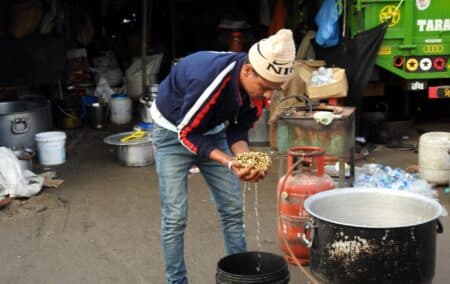Since September 2020, when Indian Prime Minister Modi enacted three new laws to reform India’s agricultural sector, tens of thousands of Indian farmers have gathered around New Delhi in protest.
On Friday, three days after an escalation of clashes across the city left one person dead and 400 police injured, the government cut power and water supplies to one of the camps on the main road into Delhi, the Ghazipur camp. New concrete barriers have been put up, and police reinforcements have been sent to the biggest camp at Singhu, also on a highway.
The government insists that the new laws will help farmers by enabling them to sell directly to corporations rather than at government-regulated wholesale markets (called Mandis), where they are assured a minimum procurement price.
Farmers say that although Mandis are imperfect, they are part of a system that allows farmers some bargaining power. Farmers pay a tax to their Mandi to run it, maintain the roads between the Mandi and the villages, and the Mandis ensure that surplus crops will be bought, even at a low price.
The new laws incentivise selling directly to a corporation. One effect of this is that it sets up corporations and Mandis as competitors. Farmers fear this is likely to eventually render the Mandis redundant, which would severely reduce their bargaining power, and deny them a means of selling surplus crops.
The government claims that the industry is inefficient, and that reforms will increase rural incomes. Farmers are not budging, however, saying that the government is acting in the interest of big corporations, not them.
Farmers acknowledge that the Mandis are not enough. But they do not trust the government and are determined to keep their land, which is ‘like a mother’ to them, from being devoured by the corporations.
[Picture: Harvinder Chandigarh, https://commons.wikimedia.org/w/index.php?curid=98627866]

